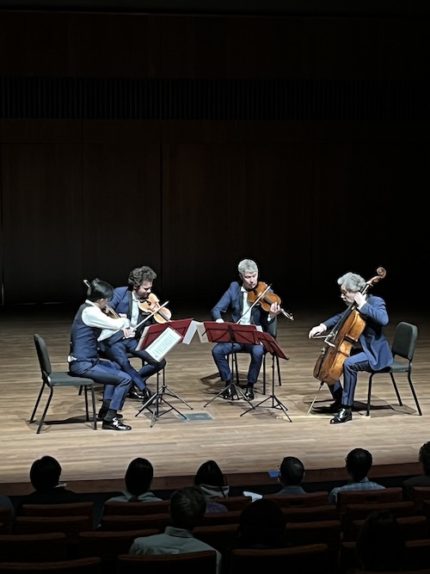Quatuor Diotima closes Korngold festival in admirable style

The University of Chicago’s “Korngold Rediscovered” festival closed with a substantial concert offered by Quatuor Diotima Sunday afternoon at the Logan Center.
The UChicago Presents program traced a compelling line through Vienna musical history from Brahms through Zemlinsky and on to Korngold. The Diotima musicians brought characteristic poise and tonal refinement to their performances while somewhat stinting on the music’s virtuosity.
Written in 1945 as he was nearing the end of his Hollywood decade, Erich Wolfgang Korngold’s String Quartet No. 3 was one of his first concert works to draw musical material from his film scores. Yet the quartet is also edgy and, at times, startlingly modern for this Late Romantic composer. The chromatic opening almost sounds like a serial piece, and the closely argued first movement is similarly taut and biting. The nervous energy of the ensuing Scherzo gives way in the middle section to the composer’s more familiar romantic style with a ripely lyrical theme (cribbed from Korngold’s just-completed score for Between Two Worlds).
The ensuing slow movement inhabits a darker introspection (using music from The Sea Wolf) with a turbulent central episode. The motoric Finale (material from Devotion) keeps energy to the fore with echoes of themes from the previous movements before erupting in a lightning coda.
For the most part, the Diotima members delivered an admirable and dedicated account of Korngold’s final quartet. The players were at their best in the ebb and flow of the slow movement, played with acute concentration.
Yet the performance didn’t quite feel entirely lived in as yet. The group’s tendency towards caution, slightly taking their foot off the pedal in the final pages, took the fizz off the composer’s requested marking (“con fuoco”) of what should be a thrilling bravura coda.
Quatuor Diotima’s performance of Brahms’ Second Quartet, Op. 51, no. 2, was largely cut from the same cloth. The ensemble brought vigor and a dark corporate sonority well-suited to the composer’s music. Yet the performance never quite jelled into a satisfactory whole. The tempo for the Andante felt fractionally impatient, not allowing enough space to explore the searching essence of the music. Elsewhere, the playing tended to lose focus at transitions with contrasting material not smoothy integrated into the larger whole.
Oddly, it was Alexander von Zemlinsky’s Quartet No. 1, the concert’s opener, which received the most successful overall performance.
One can see why Brahms advocated with his publisher Simrock to publish Zemlinsky’s debut quartet in 1895. The music is Brahmsian in character yet fitfully displays a quirky quality that seems to anticipate 20th-century neuroses.
The Diotima musicians had the full measure of the rhapsodic opening movement, playing with an ardent yet yielding touch that seemed just right. Likewise they captured the lilting off-center Allegretto as surely as the nervous energy of the central section.
The uneasy lyricism of the third movement was skillfully assayed with refined feeling and rendered with a hushed coda. The players seemed mostly in synch with the angular canter of the finale, though here too the playing seemed to turn tentative in the most demanding sections.
One aspect of UC’s Korngold festival that should not be overlooked is the school’s laudable decision to make masking optional for these public events. When will the rest of Chicago’s musical organizations break free of the enforced lockdown mentality and do the same?
The Montrose Trio performs music of Beethoven and Schubert 7:30 p.m. April 22. chicagopresents.uchicago.edu
Posted in Performances


